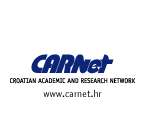

|
||
 |
||
 |
||


| Authors: Hrvoje Komerički, Igor Ljubi, Faculty of Electrical Engineering and Computing, University of Zagreb, Croatia | | Full
paper | Presentation
| |
Abstract
Since its conception two decades ago the World Wide Web had a truly remarkable expansion. Today it has extended into nearly every facet of society, from commerce to education, and it is also employed in a variety of uses, from scholarly research to casual browsing.
The World Wide Web, as its name suggests, is a global information resource in the sense that anyone, anywhere regardless of country or language [1], is free to make information available in this space. Search engines facilitate finding information, of interest, in the "ocean" of above mentioned information. Our opinion is that national homepages, national Web directories and search engines will have a crucial role in Web expansion in the countries of south and east Europe.
We explored national homepages, national Web directories and search engines of south and east Europe countries in an attempt to evaluate them and make an analysis of their functionalities and search capabilities. Based on that research, we made a comparison study between the above mentioned Web portals and our portal WWW.HR.
WWW.HR is a joint project between the Faculty of Electrical Engineering
and Computing, Department of Telecommunications and the Croatian Academic
and Research Network CARNet. As one of first Croatian portals WWW.HR
in year 2004 celebrates a decade of existence, through which time it
has been providing the basic information about the Republic of Croatia
to the surfers worldwide. It consists of two informational services,
Short info on Croatia and the Directory of Croatian Web sites.
In our comparison study we pay special attention to the Web directories,
its structures, functionalities, design, data, and used technologies.
Ten national portals, Web directories and search engines were explored,
and for each one of them we looked what technology was used in its development,
what type of information is presented next to the link to the specific
Web page saved in directory, how the data were structured and saved
(is any kind of database used), how the data are generated (collected
and stored) manually by the user by some sort of application form or
automatically (crawler-based)
using robots. We also evaluate the design in general, how friendly to
use, how precise the search results are, is the portal commercial or
not, is it sponsored by any kind of government institution, does it
contain any kind of information about the country including the historical
information, information about population of the country etc.
After the exploration was over and the data were processed the following
conclusions were made. Almost all explored portals, Web directories
and search engines were commercial, with banners and sponsored links
or news, only one was sponsored by the government (www.poland.pl), also
only few of them have had some kind of country info with some basic
information about the country. Technologies that were used in their
development varied from basic .html pages, PHP generated pages to the
JSP and ASP generated pages. The techniques used in search were also
various, some portals use CGI scripts, some PHP functions, some Perl
scripts, and some ASP functions. Majority of
explored portals are collecting data manually through on-line forms,
and some combine manual data collection with robots that collect data
automatically. The design of portals is diverse, some portals are more
users friendly some are less so.
The results of this comparison study show that the WWW.HR is still among the best national homepages and Web directories in the region because it has the country info in which the basic information about Republic of Croatia are given, it has also the modern and user friendly design with Croatian and English version of web pages. Search results of WWW.HR search engine are precise, and the catalog is well organized with cleared and intuitive structure. It has also a rather large number of hits and page views per month within the scope of Croatian Web space, and it is the only one placed among the 10 most visited websites in Croatia that is non-commercial.
References
[1] Edward T. O'Neill, Brian F. Lavoie, Rick Bennett, "Trends in the
Evolution of the
Public Web: 1998-2002", D-Lib Magazine, June 2004
[2] Gledec G, Jurić J, Matijašević M, Mikuc M: WWW.HR - Experiences
with Webserver
Development and Maintenance, Proceedings of the XXII. International
Convention MIPRO 99, p. 83-86, Opatija, svibanj 1999.
[3] Ljubi I, Gledec G: WWW.HR – An entry point to the Croatian Cyberspace,
CARNet
Users’ Conference, CUC 2000, Zagreb, rujan 2000.
[4] Ljubi I, Gledec G, Matijašević M: WWW.HR – The Rise of a National
Web Portal,
[5] Ljubi I, Gledec G, Matijašević M: WWW.HR directory: Adding value
by use of
[6] Ljubi I, Gledec G: WWW.HR: First metadata-enabled service in Croatian
Webspace,
[7] Stojsic G, Ljubi I: WWW.HR: A tool for editing Dublin Core metadata
information in
Proceedings of the International Symposium on Telecommunications VITEL
2000, p. D39 – D42, Ljubljana, Slovenija, listopad 2000.
metadata, Libraries in the digital age – LIDA 2001, Dubrovnik, svibanj
2001.
CARNet Users’ Conference, CUC 2001, Zagreb, rujan 2001.
the Croatian Web space, CARNet Users’ Conference, CUC 2002, Zagreb,
rujan
2002.